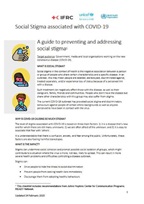.tmb-768v.png?sfvrsn=3b87d8a8_1)
Module 5
Communication, countering misperception, and increasing community engagement

Tool 15: Communications and countering misinformation
Tool overview
Evidence-informed communication with refugees and migrants
Ensuring that necessary information is both available and understood by diverse populations is an increasingly important consideration for public health planning, preparedness and response in countries with refugees and migrants. Availability of health-related information is central to ensuring equality and non-discrimination in the access to health care for specific individuals such as refugees and migrants. In health emergencies, effective communication helps to prevent death, disease and disability. Access to health information should also include the right to seek and receive impartial information and professional opinions concerning health issues.
Evidence-informed communication with the public
A first step in communication initiatives to improve communication with the public and counter negative perceptions of refugees and migrants is to dispel fears and misconception by providing and building fact-based discourse and evidence surrounding current public perceptions. Xenophobia may impact the health of refugee and migrant populations – and their host communities – in a variety of ways, including discriminatory policies, barriers to access, impaired utilization and, in many cases, poorer health outcomes.
Risk communication
During public health emergencies, people need to know what health risks they face and what actions they can take to protect their health and lives. Accurate information provided early, often and in languages and channels that people understand, trust and use enables individuals to make choices and take actions to protect themselves, their families and communities from threatening health hazards.
Guidance and tools
Guidance, training, reports
Communicating risk in public health emergencies: a WHO guideline for emergency risk communication (ERC)...
Recent public health emergencies, such as the Ebola virus disease outbreak in West Africa (2014–2015), the emergence of the Zika virus syndrome in...

Social stigma associated with COVID-19
This guide for preventing and addressing social stigma associated with the coronavirus disease 2019 (COVID-19) is intended to support governments, media...
Tools
Related teams
